In the world of above ground swimming pools, rust is a big topic. A good-quality above ground pool can last a long time, but not forever. They can be in a really poor condition and still be a good working swimming pool. I’ve seen above grounds with missing top rails, some missing uprights, old leaky liners, and poor equipment and they are still safely useable. Above grounds can be old and installed out of shape and still stand. They can have all of their coves washed away and the pool’s bottom can be a lumpy, bumpy, wrinkly mess, yet it can hold water and be ready for a party. So what kills an above ground pool? What makes a pool owner say, “This isn’t safe and it’s time for this pool to go”? In a word – rust.
Rust (or corrosion for those who have aluminum pools) is an above ground pool’s number one enemy. Rust can be an eyesore, flake into the water, cause dangerous sharp or jagged edges, and eventually causes the pool wall to split open. I frequently have pool owners who ask me about rust. Most of the time rust is no big deal so here’s some basic info on the topic.

Why Do Some Pools Get Rust?
I have an answer to that but you’re probably not going to like it because it won’t help you much. My twenty-nine years of experience has taught me that rust happens for two reasons. The first is often impossible to confirm, but I’ve seen above ground pool parts rust out due to a manufacturer’s defect of some kind. Maybe the metal had a weak spot where it wasn’t made as thick or the anticorrosive compounds of a local area were not consistent with the rest. Or maybe a particular protective coating wasn’t properly applied. Again, this is very rarely something that can be confirmed, but occasionally there is a case that you can confirm.
A couple of years ago I installed a 15-foot round pool model called a Matrix. The Matrix is a nice, but expensive, model that has a couple of things going for it. It has been manufactured by Wilbar for many years which is good and it is unique in that its entire frame is made without any metal parts at all. It does not even have metal screws. The only metal parts of a Matrix model are the wall and the nuts and bolts that hold the wall together. Now after this pool has been in use for about six months, I got a call from the homeowner who said that there was a rust spot on the wall of the pool about halfway down. My first thought was that the pool had a leak in that area somewhere as constant moisture next to metal will eventually cause corrosion. However, it usually takes a lot longer than six months for the rust to start to show so this was odd. I chose to drive over to take a look at it. This pool had no leak and no sign of moisture and the wall wasn’t dented due to some trauma. The wall just had a spot that had rusted all the way through. This was clearly a manufacturer’s defect. Though, they are really rarely provable.
The second reason is much more common and unfortunately very vague. Above ground pool parts rust because the conditions are favorable for corrosion. I know this sounds like a politician said it because it’s way too obvious and general, but hear me out and let me try to answer this next question.
So Then What Makes Conditions Favorable for Corrosion?
There is a fairly easy answer to this, but in the real world it’s not always accurate. Corrosion of course involves moisture and exposure. If the iron in steel is exposed to moisture, then the steel will rust in no time flat. Steel parts of above ground pools are galvanized which means zinc is bonded to the iron which protects it from moisture. Also, some above ground parts are coated with something to prevent moisture or water from getting to the steel. From this understanding then, if the steel stays protected and has limited exposure to moisture, then there should be no corrosion or rust. The reverse should hold true in that unprotected steel continuously exposed to moisture should corrode at a fast rate. In a laboratory that has a controlled environment where everyone wears white smocks, this will hold true 100% of the time I’m sure. In your backyard, though, it may not be so straightforward.

I’ve Seen It All
Well, I’ve seen it all, at least when it comes to rust and above grounds. I’ve seen rust where there shouldn’t be and no rust where there most certainly should have been rust. I’ve seen everything from steel walls soaking in water for years with no corrosion to super high and dry metal pool parts that have had no exposure to water rust completely apart. This is why I have this attitude as often corrosion will make no sense. There are some things you can do though to minimize a favorable condition for corrosion. Here they are:
If There’s No Rust, Don’t Do Anything
It sounds obvious, but if the pool is older and you have some top rails or top stabilizer bars or connectors that are looking aged but aren’t rusty, don’t sand them down and paint them. They may start to rust after you do that. I’ve seen it. They may not either. Who knows?
Got a Leak in Your Pool? Fix It Fast
A leak that causes the wall of the pool to be exposed to water won’t hurt the wall for a short time. If you let it continue though, the wall will likely eventually start to rust. Once something starts to corrode it continues to corrode even after the leak is repaired.
Same Applies to the Skimmer and Return
If there is even a small leak under the skimmer box or the return fitting at the wall, repair it quickly. Over time the leaking or dripping water will cause a downward line of rust to appear and the wall’s integrity will be compromised. That can kill your pool if you don’t catch it in time.
Maintain the Outside of Your Pool
Plants and grass hold moisture. Keep the exterior side of the pool’s wall free from anything overgrown. Have some rocks or mulch along the bottom perimeter to drain away any groundwater that may have collected. You can’t stop a pool from getting moisture on it, but you want it to be able to dry completely. Keeping the area clear will accomplish that.
Finally, some backyards are just more prone to have a pool rust out than others. If you have bought a pool and it rusted out, replace it with a newer model that is made mainly with resin parts instead of metal. It will cost you a little more, but will be worth it.
If you have any questions on your above ground pool then we would be happy to help, feel free to give us a call at 1-877-372-6038 or email us at upload@inyopools.com If you liked this article then make sure to sign up for Blog and get our Free 128 Page Pool Care Guide.

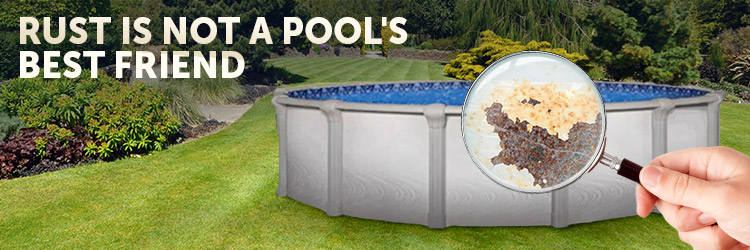
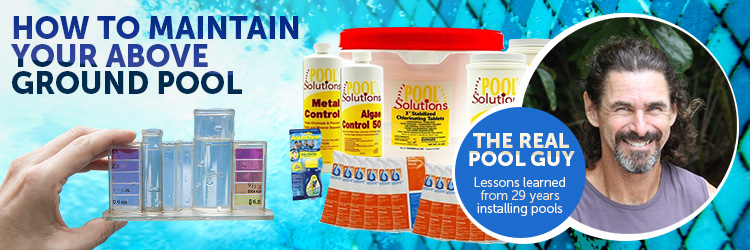
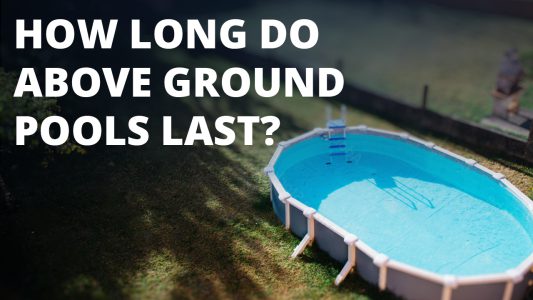
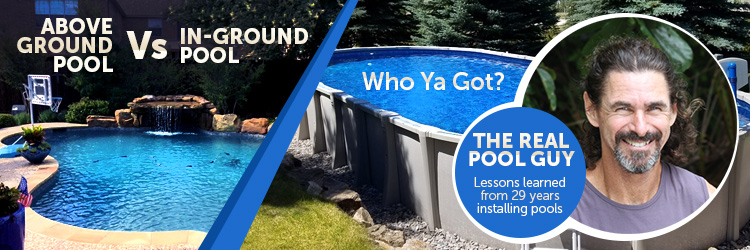
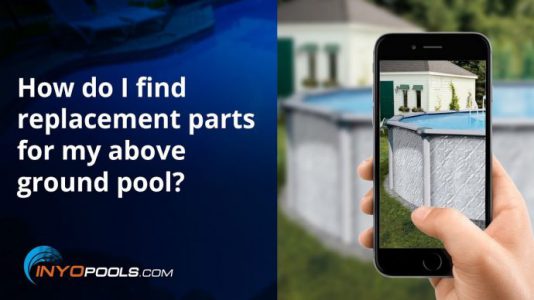






Hello,
I have had above ground pools (3 to be exact) over the last 30 years in my backyard. I had my first pool for approximately 18 years. My second pool for 8 years, and this is the fourth summer with my existing (3rd) pool. Unfortunately, this pool completely rusted through…in fact it was basically falling apart since last summer! Not only the walls were rusted out, but the top portion and some posts were losing a coating of some sort from them when you touched them??? I am still waiting to hear back from the pool store about what might be done to resolve my issue, as they agreed to provide a new wall, but nothing else. I have a problem with the fact that the pool was obviously defective, and I should not have to pay for a new pool including a liner. Have you ever heard of any issues with an aquasport above ground pool doing this? Or is there any guidance you could provide me as to how to best handle this situation with the pool manufacturer? The entire wall was rusted out and through! And no, there were no leaks, as I never had to add water, no evidence of leaks, and there was no hazardous settings surrounding the frame of the pool either to cause the entire pool to rot. Any feedback is greatly appreciated. Thank you.
Chris
Rust on the bottom outside in a couple spots. A couple spots have a nickel size hole. I have a foam pad inside the pool – replacing the liner and putting sheet metal over the holes – good idea or bad? Also what about putting a garden edging up to the wall between the rocks to stop rusting more. Yes or no? How long do these patch jobs last?
Hi, I too have a Doughboy pool, 12 years old, with saltwater chlorinator, that has been slow leaking for years (about 3/8 – 1/2 ” per day) and for the past few years, the rusted and deteriorated top steel top plates above each vertical, and the rusted and deteriorated steel stabilizer rails have been chipping off and falling into the pool and staining the liner. So this year I am replacing the liner, top plates and stabilizer rails. To help prevent the new top plates and stabilizer rails from rusting I am considering using Pond Armor/ Pond Shield Non-Toxic epoxy to coat/paint these metal parts and stainless steel screws when fastening the top plates. I am wondering if anyone who may have tried this would comment on Pond Armor’s ability to prevent these parts from rusting. I am also going to use wall foam between the liner and the wall to help protect the liner from possible rust on the pool walls.
Several rust spots that are bubbling on wall of pool what can i do
I just put in a pool and they had to grade down the yard. I need to fill in around half the pool with dirt. Is there anything I can spray on the pool or what would you recommend for protection before I put the dirt in?
We want to convert our above ground pool to saltwater… is it possible to spray a resin or any type of sealant on aluminum top seats to keep the salt water from corroding them?
Hi there,
I happened upon your webpage while looking at the problems with rust in the pool (it was the third google entry).
Hopefully this is an easy question to answer:
I have a chair in my backyard that was placed into the pool for about 15 minutes. Upon removing it, the water leaking out of the chairs’ metal legs were initially gold, rust color. I quickly hosed off the affected area above ground, but did not notice the area where the chair was in the water change in color. Is this something I have to worry about? Or is the amount of rust that could have leaked in effectively trivial for the 30k gallon pool?
Thank you very much for your input!
We just had our pool Burst, at a rust seam down the side. We had 10,000 gal. Bursting out like a flooding river!!! Our 15 yr. Old grandson was in the pool at the time. No one was hurt, but could Very Well have been a different story. We have grand babies in there regularly too!! Thank God we didnt that day!! I believe this started a few yrs. Ago when a fitting on the return was leaking down the side. We had no idea it would rust down the full length and burst like a sunami!!! I would tell anyone, if you got rust, you got a Big Problem Coming!!! Our pool was twisted and bend to blue blazes!! Not sure if we should salvage what we can or start over, but we had no clue why there are no warnings for this type of catastrophe!! I even showed it to the pool guy who changed our liner this year, nary a clue from him either!! What the Heck!! Now I wonder if a new resin pool would have any type of issues that they would tell you. Buyer Beware, Check your Pools regulary!! Be Safe Out There!!
Dena thank you for your story. I know it will help some of us out here to make the hard decision to take down a pool that is showing signs of rust. You are blessed to have gone through that without anyone getting hurt. Thank goodness. I have a fifteen year old 10 inch resin top rail doughboy pool and have noticed rust flakes underneath top resin rail falling into pool. Am losing water so know the liner is leaking. I have thought about replacing liner, but may just take it down. Starting to think it’s not worth it to push it anymore. We loved this pool through the years and feel it owes us nothing. Thanks again Dena for telling others what happened to you. And thanks Dan for an excellent article.
My 21’ round symphony pool just did the exact same thing as you are describing. My pool is 2.5 yrs old and it burst right at the water intake side. It seems it started rusting from behind the liner. I’m currently waiting for the company who sold it to me to contact me about what they are gonna do about it. Did your warranty cover the damages?
I have a small scratch on the outside of my above ground pool. I have only had the pool one year. How should I repair this?
You probably don’t have to worry about it but keep an eye on it. If it starts to rust, then protect it with something to slow it down.
I have a few rust spots on the outside of my pool no leakage Any where . Had liner replaced 3 year ago and these same spots were there. Should I do anything . Pool putty to cover up and /or reinforce rusted spots?
I don’t know but you can only improve the rust situation from the inside of the wall. Wait until it’s time to change the liner.
Is anything required on the outside of the pool wall such as a sand cement mixture? To divert water?
Nothing is needed on the outside of an above ground pool. They are all coated.
What type of paint should I use on the exterior wall of my above ground pool? It’s a small spot
My pool wall has rust down the side where the filter is. Should I spray It with flex seal. I did have a pool that split open a couple of years ago. Please help me.
I’m trying the Flex Seal spray rubber on all metal parts of my new pool before putting it up. Spraying inside and out and will touch up spots if needed after putting it together. Hopefully this will help keep the salt from corroding the metal.
I have to back fill a few inches up the wall of my pool with dirt and than I will change to rocks. What can I coat the pool wall with around the bottom? Roofing tar? If so can I put landscape fabric or plastic sheeting on the tar to keep dirt from actually touching the wall directly? Any advise is welcome. Thank you.
Pool walls typically don’t rust any more in the ground than above so I don’t think you have to coat it but you can. I wouldn’t use any type of plastic though as you don’t want to cause any moisture to get trapped on or near your wall.
I’d have to disagree, I bought a Shark pool made in USA and made of coated steel. I had to partially bury it as the yard slopes…I now have plenty of rust on outside walls beneath the dirt and stones used to backfill….I’m thinking of digging out the backfill, using a wire brush to get some rust off, then hit it with cold galvanizing compound/zinc spray paint.
I decided to use Rustoleum gray spray paint in all the tubes. May as well stop rust before it starts. Costs a bit more but it has the brand name.
I have a Coleman 22 that I’m setting up. After reading about the rust, I’m spraying the inside of the tubes with white spray paint. They are bare steel, not galvanized. How about WD 40 too? Only the outside is painted.
Hi. Keep in mind what you paid for your pool. It’s made in China with Chinese steel. If it wants to rust, it will not matter what you do.
I know some deem this as idiotic but I have a pretty large above ground pool and just got a nice salt water system and huge sand filter. I was talking to someone who told me some chemical to buy and out on the. Metal , which is just on the outside and around the top. But I cannot remember what he said or find the message. Is there anything you recommend that I can buy and out on my poles so the salt does not rust them, I have not converted it yet and wanted to do so after I found something.
I’m not aware of anything specific. I’ve seen people coat their pool parts with all kinds of stuff.
Maybe ACF-50 anti-corrosion spray?
How do I remove the rust flakes in the bottom of the pool? Vacuum doesn’t pick them up
Get a stronger vaccum. Which could mean you need to get a better pump/filter. Which, it you have an Intex or Walmart pool, could also mean to get a better pool.
Use a magnet
Thanks for the advice, will look into cost of spray foam.
Can I insulate my above ground pool on the outside it is a metal frame and at the moment shows no sign of rust I live in the uk so our weather is mild so I need to keep the heat in we have a very good solar cover and pool heater but I still lose a lot of heat during the night please help
Not sure what would be best for this. I’m thinking spray-on foam would be your best bet but it’s most likely too expensive. If you are willing to pay for it, then the two concerns would be appearance and the potential trapping of moisture. I think you’re ok moisture wise but appearance wise, you would have to hide the foam with a finish. And that may really add to the cost of the project.
Shouldn’t this rusting be covered under warrenty? My pool is only rusting in two main spots and is dropping in my pool in chucks.
Yes Pam, the rusting may be covered under your warranty. Check your pool’s paperwork or contact the manufacturer to determine your eligibility for a replacement wall section.
I have a 25×30 seaspray evolution oval salt water pool. The top rails & other materials are resin coated. I had mine installed in 2016. I have rust all the way around the top rails. How do I get them to warranty this issue
I have a defective rust spot and growing on the side wall. How do I repair? Thanks Clara
Luckily Dan covers that topic is this article: Advanced Wall Repair for an Above Ground Pool